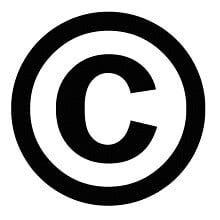Copyrights are among the most valuable and important types of intellectual property. A “copyright” is a property right that exists for original artistic works. Books, songs and movies are common examples of artistic works that are protected by copyright law. Generally, low-level copyright protection comes into existence when the original artistic work is completed. Among the legal rights that come into existence when the original work is completed are the right to control who may use or copy the original work and who may create derivative works (works that are based on the original).
However, copyrights are given a powerful extra layer of protection by the federal Copyright Act. See 17 U.S.C. §101 et seq. Among the most important protections provided by the Copyright Act is the ability to:
- Sue third parties for copyright infringement
- Collect statutory damages and
- Be awarded attorneys’ fees
See 17 U.S.C. § 412. However, to be eligible for these three important protections, an artist or creator must register their copyright with the Copyright Office in Washington, D.C. See 17 U.S.C. § 411(a). Moreover, the process of obtaining registration must be complete before any of these protections come into existence. This is the holding of a recent unanimous US Supreme Court case called Fourth Estate Public Benefits Corp. v. Wall-Street.com, 139 S.Ct. 881 (2019) (registration must be completed before an infringement case can be commenced). Experienced copyright attorneys, like the ones at Revision Legal, can detail your rights under the copyright laws and explain what is required to fully protect your rights.
The process of registering a copyright takes time, so owners must be mindful of the long lead times if infringing behavior is discovered and litigation is being contemplated. Normal processing of a registration application takes several months. Even with expedited processing, registration still takes several weeks. For these reasons, the best practice is to register copyrights very early in the process either just after the original work is completed or just as the commercial monetization of work is beginning.
There is another important and often overlooked reason for registering copyrights early in the process. This reason relates to the potential necessity for emergency injunctive relief from a federal court. Such “emergency injunctive relief” would be requested pursuant to a motion for a temporary restraining order (“TRO”). An example of a TRO request would be asking a federal judge to stop immediately the release of a book or movie that infringes on your copyright. However, as suggested, TROs are only issued in an “emergency.” In legal jargon, a copyright plaintiff must show “irreparable harm” by the infringing behavior if the TRO were to be denied.
While there is a legal presumption that there is irreparable harm/injury if copyright infringement is shown, that presumption can be rebutted. Among the potential rebuttal arguments is that there is no need for urgent judicial action since the copyright owner felt no urgency in registering their copyright. A defendant might ask “How can there be “irreparable harm” if the plaintiff has been waiting and dithering for weeks and months while the Copyright Office processed the application for registration? Further, the defendant can argue that there is no irreparable harm because copyright protection was not important to the artist. Otherwise, the artist would not have waited until the last minute to file for registration.
Of course, it is unknown whether these sorts of rebuttal arguments would “carry the day” before a federal judge. But these defense arguments can be entirely eliminated by an early copyright registration.
If you have questions about protecting your copyrights and other intellectual property, contact the copyright lawyers at Revision Legal at 231-714-0100.




